Traditional Ballads in New England I
by Phillips Barry
The Journal of American Folklore, Vol. 18, No. 69 (Apr. - Jun., 1905), pp. 123-138
[This is the first part of Barry's Traditional Ballads in New England, all three parts were published in 1905 in three consecutive editions of the JOAFL. These early ballads are fully preserved because Barry recognized that including the tune whenever possible was as important as including lyrics.]
TRADITIONAL BALLADS IN NEW ENGLAND
I. INTRODUCTION
UNRECOGNIZED in its extent, if not indeed unknown as an element in American literature, is a widespread undercurrent of traditional folk-song. Popular poetry, even of the better sort, is by no means yet dead; it lives on in every part of our broad land, as well in the heart of the populous city as on the lonely hillside. My researches, during the past two years, have been for the most part limited to a special field of activity, -the gathering of the remains, scanty, it seemed at first, of the older strata of the tra- ditional folk-song, represented by the English and Scottish ballad. Scattered over the country, versions of several ballads, notably " Lord Randal," "The Elfin Knight," "Henry Martin," and two or three others, have been known to collectors for some time, supposed to be the last fading flowers of popular poetry in the New World. It seems, however, not to have occurred to the collectors to draw an inference from the excellent condition in which they found them preserved. A ballad, extinct, or nearly so, appears in a short and mutilated form; if it still retains the main facts of the story, and especially if the air has been preserved, its life is not yet ended, or near an end.
New England, the oldest portion of our country, contrary to what has been supposed, is still the home of a large amount of traditional folk-song, much of it of the best order. In all, sixty-six versions of fourteen of the ballads represented in Professor Child's volumes have come to my notice in the past two years. And of these a very few come from early broadsides, hitherto unrecorded, representing a tradition now extinct; the great majority, however, are still sung by elderly, or in some cases by young people, and are derived from purely oral sources, uncontaminated by hack-balladry. The best of them, those whose antiquity is most clearly attested, come from Vermont; the greater number are from Massachusetts. At present -for augmentations will come in from time to time - the complete list of the ballads recovered by me in New England is as follows: -
The Elfin Knight,
Lady Isabel and the Elf-Knight,
The Twa Sisters,
Lord Randal,
Young Beichan,
Lord Thomas and Fair Annet,
The Gypsy Laddie,
The Demon Lover,
Henry Martin,
Our Goodman,
The George Aloe and the Sweepstake,
The Golden Vanity,
Captain Ward and the Rainbow,
The Mermaid.
Nearly half of these are preserved in their entirety as folk-songs, that is, with the original airs. Collectors have not always noted the importance of the air as a means of preserving the ballad. Often it happens that persons who can sing a ballad of twenty or more stanzas, without a break, will be unable to recite, apart from the tune, more than three consecutive stanzas, and seldom these correctly. This illustrates an important point in connection with the transmission of ballads, namely, that the words constitute but one half of a folk-song; the air is no less an essential part. The origin of these ballads in New England and elsewhere is a question to be considered.
There are two possible sources, pure tradition and contaminated tradition, as it may be called. Pure tradi- tion, the source of the best ballads, as "Lord Randal," "The Twa Sisters," and others, perpetuates itself orally, unassisted by the baser art of broadside hack-balladry. It may be early, going back to the time of the first settlers, as is the case with "The Elfin Knight" and "The Golden Vanity," or, on the other hand, it may be more recent. This recent tradition may come either direct from the old countries, or by way of the British provinces. The best version of "The Gypsy Laddie" comes from Nova Scotia. Contaminated tradition occurs when the direct line of transmission is for the time interrupted by a printed form of the ballad, which may or may not pass again into oral circulation, and its ultimate origin be forgotten with the perishing of the broadside. "Young Beichan" and " Captain Ward and the Rainbow" were printed in Boston by Coverly, during the first decade of the last century, and seem to have met their death at the hands of the printer, though there is evidence that " Young Beichan " at least was in oral circu- lation as late as I790. On the other hand, "Lord Lovell," one of the best known of ballads, in its many versions differing from each other very slightly, must go back to print, perhaps a lost broadside by Coverly. The same printer issued a broadside of " Chevy-Chase," differing only in eccentric spelling from the textus receptus. In the case where contaminated tradition is suspected, it is not always easy to say just how much the broadside affected the pre- existing oral tradition.
The subject-matter of the present article will for convenience be divided into parts. The first part will include versions of the follow- ing ballads: -
1. The Golden Vanity.
2. Lord Thomas and Fair Annet.
3. The Twa Sisters.
4. Lady Isabel and the Elf-Knight.
5. The George Aloe and the Sweepstake.
6. Henry Martin.
7. The Mermaid.
8. Captain Ward and the Rainbow.
1. THE GOLDEN VANITY
A. "The Little Cabin Boy." Recorded January 13, 1905, by M. E. B., Irasburg, Vt., from the singing of an aged man born in Glover, Vt.
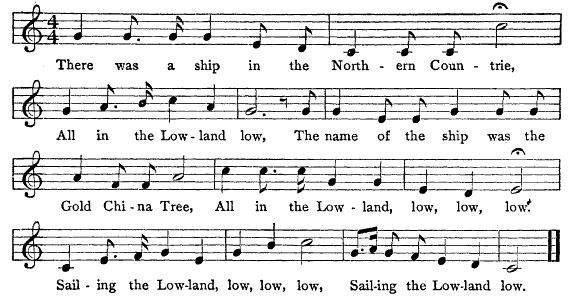
1. There was a ship in the Northern Countrie,
All in the Lowland low,
The name of the ship was the "Gold China Tree,"
All in the Lowland low, low, low.
Sailing the Lowland, low, low, low,
Sailing the Lowland low.
2 She had not sailed past leagues two or three,
All in the Lowland low,
She had not sailed past leagues two or three
Before she espied a French Galilee.
3. The first that spoke was the ship Captain's man,
All in the Lowland low,
Saying, "Master, O Master, we're all undone,
All in the Lowland, low, low, low!"
4. Next spoke up was the little Cabin Boy,
All in the Lowland low,
Saying, "Master, O Master, what will you give to me,
If I will sink the French Galilee ?"
5. "Oh, I will give you gold, and I will give you fee,
All in the Lowland low,
And my eldest daughter your bride shall be,
All in the Lowland low, low, low."
6 He smote upon his breast, and away swung he,
All in the Lowland low,
He smote upon his breast, and away swung he,
And he swung till he came to the French Galilee.
7. Then he espied a little augur that came from a nun,
All in the Lowland low,
Then he espied a little auger that came from a nun,
And bored holes with it, twenty and one.
8. Some threw their hats, and some threw their caps,
All in the Lowland low,
Saying " For the Lord's sake, stop up the salt water gaps!
All in the Lowland low, low, low!"
9. He smote upon his breast, and away swung he,
All in the Lowland low,
He smote upon his breast, and away swung he,
Until he came to the "Gold China Tree."
10. Then all around the ship this little boy did swim,
All in the Lowland low,
Saying, " Master, O Master, won't you take me in?
Or I'll serve you as I 've served them!"
11. They threw out a rope, and they slightly drew him in,
All in the Lowland low,
They threw out a rope, and they slightly drew him in,
And then he began to dance and sing,
12. Saying, " Master, O Master, what will you give to me,
All in the Lowland low,
Saying, Master, O Master, what will you give to me ?
For I have sunk the French Galilee!"
13. "Oh, I'll give you gold, and I'll give you fee,
All in the Lowland low,
Oh I'll give you gold, and I'll give you fee,
And I'll give you the land of North Amerikee!"
14. "Oh, I'll have none of your gold, or none of your fee,
All in the Lowland low,
Oh, I'll have none of your gold, or none of your fee,
But your eldest daughter my bride shall be!"
15 He married the daughter in spite of them all,
All in the Lowland low,
He married the daughter in spite of them all,
May the Devil take the Captain, sailors and all!
B. Taken down by me, October 2, 1904, from the singing of J. G. M., Newbury, Vt.
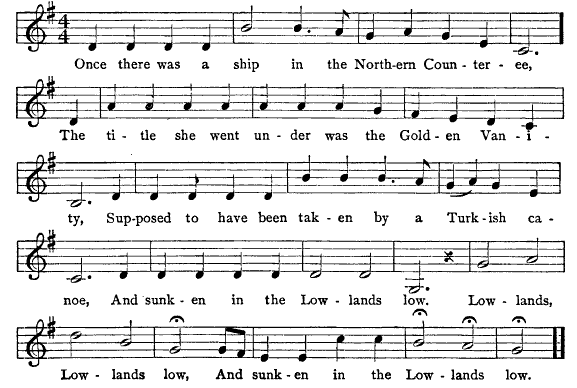
1. Once there was a ship in the Northern Counteree,
The title she went under was the Golden Vanity,
Supposed to have been taken by a Turkish canoe,
And sunken in the Lowlands low.
Lowlands, Lowlands low,
And sunken in the Lowlands low.
2 The first on the deck was the little Cabin Boy,
Saying, " Master, what'll you give me, if the ship I will destroy?"
"My gold I will give you, my daughter for a bride,
If you'll sink her in the Lowlands low!"
3 . . . . . . . . . .
. . . . . . . . . . .
. . . . . . bored holes three times three,
And sunk her in the Lowlands low.
II. LORD THOMAS AND FAIR ANNET
A. "Little Eleanor." Recorded February, I905, by M. E. B., Irasburg, Vt., from the singing of an aged man born in Glover, Vt.
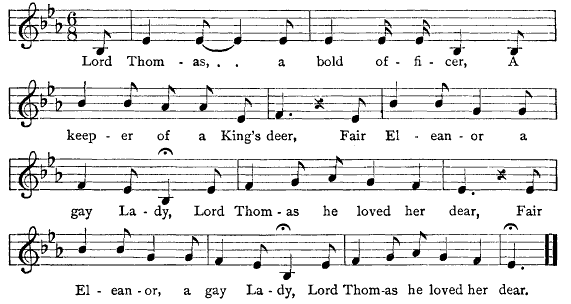
1. Lord Thomas a bold officer,
A keeper of a King's deer,
Fair Eleanor a gay Lady,
Lord Thomas he loved her dear.
REFRAIN, - Fair Eleanor a gay Lady,
Lord Thomas he loved her dear.
2 "Come riddle us, riddle us, mother," he said,
"Come riddle us both as one,
Had I better marry Fair Eleanor,
Or bring the brown girl home?"
3. "The brown girl, she has houses and lands,
Fair Eleanor, she has none,
So now I will advise you, as a blessing,
Go bring the brown girl home!"
4. He dressed himself in his best attire,
His clothing all in white,
And every city that he rode through,
They took him to be some knight.
5 And when he came to Fair Eleanor's door,
He knocked so hard on the ring,
There was none so ready as Fair Eleanor,
To arise and let him in.
6 "What now, what now? " Fair Eleanor cried,
"What news do you bring unto me? "
"I have come to invite you to my wedding!"-
"That's very bad news!" said she.
7 "Come riddle us, riddle us, mother," she said,
"Come riddle us both as one,
Had I better go to Lord Thomas's wedding,
Or had I better stay at home?"
8. "There are few would prove your friends, daughter,
There are many would prove your foes,
So now I'd advise you as a blessing,
Lord Thomas's wedding don't go!"
9. "There 's few would prove my friends, mother,
There's many would prove my foes,
Betide my life, betide my death,
Lord Thomas's wedding I will go."
10. She dressed herself in her best attire,
Her clothing all in green,
And every city that she rode through,
They took her to be some queen.
11. And when she came to Lord Thomas's door,
She knocked so hard on the ring,
There was none so ready as Lord Thomas himself,
To arise and let her in.
12 "Is this your bride?" Fair Eleanor cried,
"To me she looks wondrous wan,
You might have had me, as gay a lady,
As ever the sun shone on!"
13 The brown girl, she had a knife in her hand,
It was both long and sharp,
She placed it against Fair Eleanor's side,
And pierces it to her heart.
14. "What ails you, what ails you?" Lord Thomas cried,
"To me you look wondrous wan,
The blood that was in your cherry red cheeks
Is all faded away and gone!"
15. "Oh, where are your eyes?" Fair Eleanor cried,
"Can't you but skim the seas?
The blood that was in my cherry red cheeks
Is trickling down my knees ! "
16. Lord Thomas, he had a sword in his hand,
It was both sharp as an awl,
And with it he cut the brown girl's head off,
And threw it against the wall.
17 He laid the sheath down on the ground,
He put the point through his own heart,
Did you ever see three lovers so soon met,
That were so soon apart?
B. Last stanza of a version of this ballad, sung by a young man about 1860. Contributed by I. L. M., Vineland, N. J., originally from Lynn, Mass.
"Now dig a grave," Sir Thomas cried,
"And dig it wide and deep,
And place Fair Elinor at my side,
And the brown girl at my feet!"
III. THE TWA SISTERS
A. Recollected June, 1904, by W. M., of the U. S. Navy, as sung forty years ago by the midshipmen at Newport, R. I.
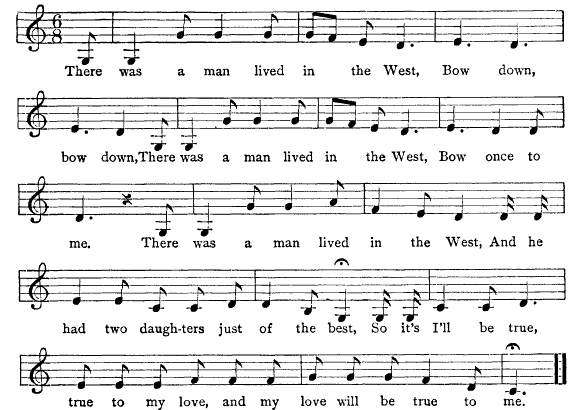
1. There was a man lived in the West,
Bow down, bow down,
There was a man lived in the West,
Bow once to me.
There was a man lived in the West,
And he had two daughters just of the best.
So it's I'll be true, true to my love,
And my love will be true to me!
2. The miller, he loved the youngest one,
But he was loved by the eldest one.
3. He gave the youngest a gay gold ring,
But he gave the eldest never a thing.
4. He gave the youngest a satin hat,
But the eldest, she got mad at that.
5. They took a walk by the river side,
Alas! I must tell what did betide.
6. The eldest, she pushed the youngest in,
And all for the sake of the gay gold ring.
7. "Oh, sister, oh, sister, oh, save my life!
And you shall be the miller's wife !"
8. She swam till she came to the miller's pond,
And there she swam around and around.
9. The miller, he took his hook and line,
And caught her by her hair so fine.
B. Taken down by H. M. R., in Calais, Maine
1. There was a man lived in the West,
Bow down, bow down,
There was a man lived in the West, -
The bow is bent to me,-
There was a man lived in the West,
He loved his youngest daughter best.
Prove true, prove true,
Oh, my love, prove true to me!
2 One day he gave her a beaver hat,
Her sister, she did not like that.
3 As they were walking on the green,
To see their father's ships come in.
4 As they were walking on the wharf,
Her sister, she did push her off.
5 "Oh, dear sister, give me your hand,
And you shall have my house and land!"
6. "No, I will not give you my hand,
But I will have your house and land."
7. Sometimes she sank, sometimes she swam,
Until she came to a miller's dam.
8. The miller, he put in his hook,
And fished her out by her petticoat.
9. He stripped her off from toe to chin,
And then he threw her in agin.
10. Sometimes she sunk, sometimes she swum,
Until she came to her long home.
11. Her sister was hanged for her sake,
And the miller he burned at the stake.
IV. LADY ISABEL AND THE ELF-KNIGHT
A. Contributed by L. W. H., Cambridge, Mass., in whose family it has been traditional for three generations.
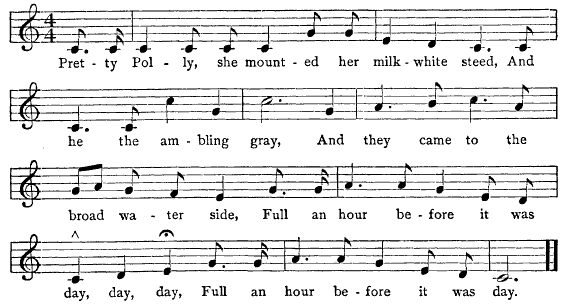
1. Pretty Polly, she mounted her milk-white steed,
And he the ambling gray,
And they came to the broad water side,
Full an hour before it was day, day, day,
Full an hour before it was day.
2. "Now light you down, Pretty Polly," he said,
"Now light you down," said he,
"For six Pretty Pollies have I drownded here,
And the seventh you shall be."
3. "Take off your clothes, so costly, so fine,
And eke your velvet shoon,
For I do think your clothing is too good,
For to lie in a watery tomb."
4. "Won't you stoop down to pick that brier,
That grows so near the brim?
For I am afraid it will tangle my hair,
And rumple my lily-white skin."
5. So he stooped down to pick that brier,
That grew so near the brim,
And with all the might that the Pretty Polly had,
She did tumble the false knight in.
6. "Lie there, lie there false knight," she said,
"Lie there all in my room,
For I do not think your clothing is too good,
For to lie in a watery tomb!"
7. Pretty Polly, she mounted her milk-white steed,
And led the ambling gray,
And she came to her father's stable door,
Full an hour before it was day.
8. Then up and spoke her pretty parrot,
And unto her did say,
"Oh, where have you been, my Pretty Polly,
So long before it was day?"
9. "Oh, hold your tongue, you prattling bird,
And tell no tales of me,
And you shall have a cage of the finest beaten gold,
That shall hang on the front willow-tree!"
10 Then up and spoke her father dear,
And unto the bird did say,
"Oh, what makes you talk, my pretty parrot,
So long before it is day?"
11. "The old cat came to my cage door,
And fain would have eaten me,
And I was a-calling to Pretty Polly,
To drive the old cat away."
V. THE GEORGE ALOE AND THE SWEEPSTAKE
Recollected, June, 1904, by W. M., of the U. S. Navy, as sung over forty years ago by an ancient mariner.
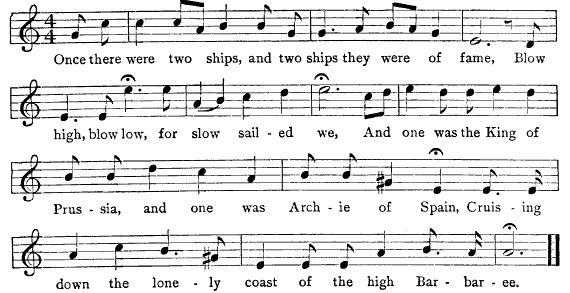
1. Once there were two ships, and two ships they were of fame,
Blow high, blow low, for slow sail-ed we, -
And one was the King of Prussia and one was Archie of Spain,
Cruising down the lonely coast of the high Barbary.
2. "Now aloft, there aloft! " our gallant commander cried,
"Look ahead, look astern, look to windward and to lee!"
3. "Oh, there's nothing ahead, and there's nothing astern,
But there 's a lofty frigate to windward, and another on our lee."
4. "Now, hail her, oh, hail her!" our gallant commander cried,
"Oh, I am the salt sea pirate, as this night you soon shall see!"
5. Then broadside for broadside this daring dog did pour,
Till the man at the helm shot the pirate's mast away.
6. Then for mercy, for mercy this daring dog did cry,
"Oh, the mercy I will give you, I will sink you in the sea!"
7. "Your ship shall be your coffin, and your grave shall be the sea,
Your ship shall be your coffin, and your grave shall be the sea!"
VI. HENRY MARTIN
Communicated by S. C. G., Minneapolis, Minn., as sung over fifty years ago.
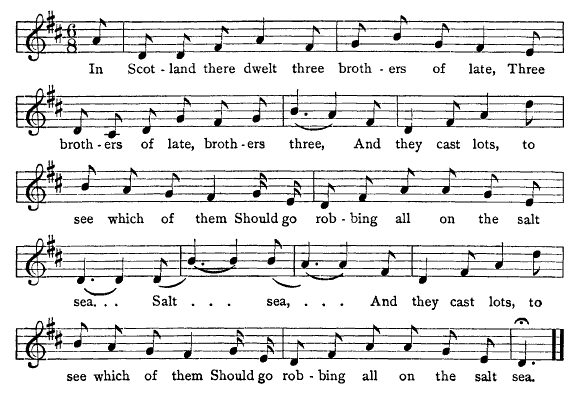
1. In Scotland there dwelt three brothers of late,
Three brothers of late, brothers three,
And they cast lots, to see which of them
Should go robbing all on the salt sea.
Salt sea!
And they cast lots, to see which of them
Should go robbing all on the salt sea.
2. The lot it fell on Henry Martin,
The youngest of these brothers three,
That he should go robbing all on the salt sea,
To maintain his two brothers and he.
3. He had scarce sailed one long winter's night,
One long winter's night on the sea,
Before he espied a lofty brave ship,
A-sailing off over the sea.
4. "Put back!" he cried, "and square your main tack, -
Come sail down under my lee,
Your gold we'll take from you, your ship we'll let drift,
And your bodies we'll sink in the sea!"
5. Broadsides, broadsides they gave to each other,
They fought for hours full three,
Till Henry Martin received his death wound,
And his body did sink in the sea.
6. Bad news, bad news I bring to old England,
Bad news I bring unto thee,
Your rich merchant ship is now cast away,
And your mariners sunk in the sea.
VII. THE MERMAID
Recorded by me October I , 1904, from the singing of J. G. M., Newbury, Vt.
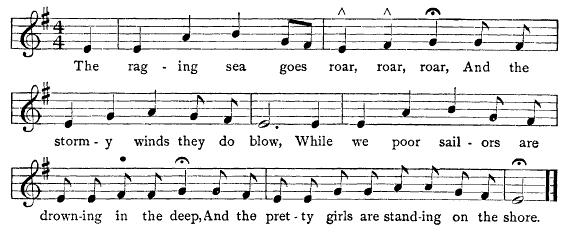
1. The first came up was the carpenter of the ship,
And a hearty old fellow was he,
Saying, " I have a wife in old England,
And a widow I 'm afraid she will be!"
REFRAIN, - For the raging sea goes roar, roar, roar,
And the stormy winds they do blow,
While we poor sailors are drowning in the deep,
And the pretty girls are standing on the shore.
2. The next came up was a little cabin boy,
And a nice little fellow was he, Saying, -
"I'd give more for my daddy and my ma,
Than I would for your wives all three!"
3 The next came up was a fair pretty maid,
With a comb and a glass in her hand,
Saying, · , , *, * , , * * , * * , ,
VIII. CAPTAIN WARD AND THE RAINBOW
"Captain Ward, the Pirate, with an account of his famous fight with the Rainbow, ship of war. Nathaniel Coverly, jun., Printer, Boston." Broadside, printed not later than 1814, of which two copies are known to me, -one in the Isaiah Thomas collection of the American Antiquarian Society, Worcester, Mass., the other in the Boston Public Library.
1. Strike up you brave and lusty gallants, with music sound of drum,
For we have espied a rover, which to our seas have come.
His name you know is Captain Ward, right well it doth appear,
There has not been such a rover found out this thousand year.
2. For he has sent unto our King, on the fifth of January,
Desiring that he might come in with all his company,
And if you will let me come, till I my tale have told,
I will bestow for my ransom full thirty tons of gold.
3. First he deceived the wild Turk, and then the King of Spain,
Pray how can he prove true to us, when he proves false to them?
"Oh, no, oh no," then said the King, " for no such thing can be,
For he has been a rank robber and a robber on the sea."
4. "Oh then," says Captain Ward, "my boys, let's put to sea again,
And see what prizes we can find on the coast of France and Spain."
Then we espied a lofty ship a-sailing from the west,
She was loaded with silks and satins and cambricks of the best.
5. Then we bore up to her straightway, they thinking no such thing,
We robbed them of their merchandise, then bade them tell their King.
Now when their King did hear of this, his heart was grieved full sore,
To think his ships could not get past, as they had done before.
6. Then he caused built a worthy ship and a worthy ship of fame,
Oh, the Rainbow, was she called, and the Rainbow was her name.
Oh he rigged her, and freighted her, and sent her to the sea,
With five hundred and fifty mariners to bear her company.
7. They sailed east, they sailed west, but nothing could espy,
Until they came to the very same spot where Captain Ward did ly.
"Who is the owner of this ship?" the Rainbow then did cry,
"Here am I!" says Captain Ward, "let no man me deny!"
8 "What brought you here, you cowardly dog, you ugly wanton thief?
What makes you lie at anchor, and keep our King in grief?"
"You lie, you lie!" says Captain Ward, "so well I hear you lie,
I never robbed an Englishman, an Englishman but three.
9 As for the worthy Scotchmen, I love them as my own,
My chief delight is for to pull the French and Spaniards down."
"Why say'st thou so, bold robber? We'll soon humble your pride!"
With this the gallant Rainbow, she shot out of her side
10. Full fifty good brass cannons, well charged on every side,
And they fired their great guns, and gave Ward a broadside.
"Fire on, fire on!" says Captain Ward, "I value you not a pin,
If you be brass on the outside, I'm good as steel within!"
11. They fought from eight in the morning, till eight o'clock at night,
Till at once the gallant Rainbow began to take to flight.
"Go home, go home," says Captain Ward, "and tell your King from me,
If he reigns King upon dry land, I will reign King at sea!"
12 With that the gallant Rainbow, she shot and shot in vain,
Then left the Rover's company, and home returned again.
To tell our King of England, his ship's returned again,
For Captain Ward, he is so strong, he never will be ta'en.
13. "Oh, everlasting shame!" said the King, "I have lost jewels three,
Which would have gone unto the sea, and brought proud Ward to me.
The first was the brave Lord Clifford, great Earl of Cumberland,
The second was the Lord Mountjoy, as you shall understand,
The third was the brave Lord Essex, from the field would never flee,
Who would have gone unto the sea, and brought proud Ward to me!"
Phillips Barry.
BOSTON, MASS.